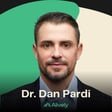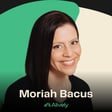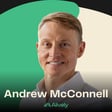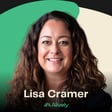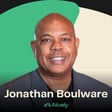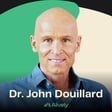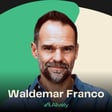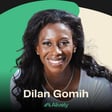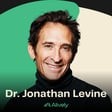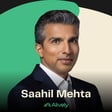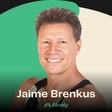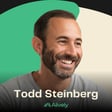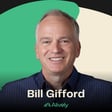Love the Process in Life
00:00:00
Speaker
I am a huge proponent of the process, about being a super nerd about the process of anything you do, whether it's your family, your business, your yourself, like anything. Like you have to love the process because if you don't love the process, you know, the victory lap doesn't take long enough to make it worth it.
Introduction to Home of Health SPAN Podcast
00:00:22
Speaker
This is the Home of Health SPAN Podcast, where we profile health and wellness role models, sharing their stories and the tools, practices, and routines they use to live a lively life.
Reflecting on Pre-Pandemic Life
00:00:36
Speaker
Laura, great to see you. I don't know if you remember the last time we got together in person was February of 2020 before the shit hit the fan for the for the glow. It was the very last trip I think I took and probably most people at that event took. Yeah. Yeah. It was it was a great event. And I'm glad we got it in before I was living in a condo for months on end.
Work-Family Balance During the Pandemic
00:01:02
Speaker
You know, you had it much harder than I did because you had a much younger child. I had teenagers who could, you know, they knew how to turn on their Zoom. They knew how to go to school on their own. They could, you know, make their own food. I felt i felt badly for people who had younger kids.
00:01:16
Speaker
Yeah. had I had more than a full-time job. My wife had more than a full-time job. And then we got this new full-time job of a four-year-old at the time. She had just turned four. It was a lot. And we had our best family friend was friends with hers. they She was a single mom with two twins that were three. And so I would try to take all three girls and take them to the park and everything.
Lucky Move to Bermuda
00:01:36
Speaker
So it was a lot going on.
00:01:38
Speaker
That's a lot going on. I know I always ask people, I'm like, are you working out of your home or are you homing out of your work? Like, tap what's happening? What's happening? Yeah. But then you made a great lifestyle choice and moved to Bermuda. So I think you're smarter than all the rest of us combined. I think luckier. I don't think that was as much. ah I tell people we're in the fourth year of our one month visit, so it's not like my amazing forecasting abilities.
Unlocking Potential in Others
00:02:02
Speaker
We're here to talk about you, right? you You are an author, you are a speaker, I think more than a million views on your TED Talk. You are a coach ah and an entrepreneur and a whole group around that. and then And a runner is understanding your training for the London Marathon now. And so it could be easy for people from the outside in and be like, oh, well, she just has everything, right? like it's just It's easy for her.
00:02:26
Speaker
but I know you've you've had some challenges along the way, and that's kind of helped make you who you are. And also, I imagine inspire you to be that unlocker of human potential and others that it seems like you've kind of committed to and dedicated yourself to. Yeah, it actually might even be the other way around. I think I've always been somebody like if I have a secret superpower, it's that I can see somebody's magic.
00:02:52
Speaker
kind of often faster than they can see it themselves and I can see it and reflect it back on them in ways that they can actually see it and maybe believe it for the first time ever and actually act upon it and it's always been who I am. I am a just a serial follower and lover with people like I just see them and I see their magic and I love them and I want them to have that greatest best version of themselves and so I went into a career in executive
Athletic Pursuits and Autoimmune Challenges
00:03:15
Speaker
search. First I was in politics then I was in executive search so that the It tracks that I would always be somebody who who wanted to see and help somebody get to their their greatest potential. So of course now I'm in personal development and self-help as a speaker and an author. But I actually didn't run the first mile of my life until I turned 39 years old. So I'm a very late in life athlete. And after becoming an athlete, then I had this crazy autoimmune disease that forced me to go, oh, I better take some of my own medicine.
00:03:47
Speaker
I better figure out how I helped all these other people for my whole life because I need it right now because I don't know if I'm good. I got so sick in 2021. I didn't know if I was going to see 2022.
Social Connection as a Health Pillar
00:03:58
Speaker
So I had to sort of turn the lens back on myself and say, OK, sister, like does any of your stuff really work or use it as sort of nonsense? And I really had to go to school on on pulling myself out from the very deepest, darkest part of the well.
00:04:14
Speaker
To the extent you're comfortable sharing, that's really where I want to dig in. What what I find interesting for this conversation is so many of the people we talk to, they come at it fitness or nutrition, maybe even sleep first. right And that that fifth pillar of health, of social connection and purpose, is the one that's less natural. It's the one they have to say, hey, you know I came to later.
Political Passion and AmeriCorps Creation
00:04:37
Speaker
I'm having to really deliberately craft around to to get that in.
00:04:41
Speaker
Whereas you're the inverse, right? like It sounds like from the beginning, that that social connection, that purpose of eliciting and inspiring and empowering the best in others is is's just who you are. but that That is something that comes more naturally. And definitely seeing you on stage, I can i can see that. can Can you provide an example, ah even back like in high school, like what what that would look like?
00:05:06
Speaker
Well, in high school, it looked like me being absolutely yeah obsessed with what was happening politically. I grew up in Miami and I was super obsessed with everything that was happening in politics. It was the time of sort of Reagan Republicanism. And I was in middle school at the time when there was the Iran hostage crisis.
00:05:25
Speaker
And I remember thinking, like, we're the greatest nation in the world. Why can't we get our hostages out of Iran? I don't understand what's happening. Like, why is this? And Jimmy Carter was running for election and Ronald Reagan was like the strong man, you know, governor, very ah charismatic, great communicator. And Then he won and the hostages were released and I was like, oh, okay, magic, right? Leaders solve problems. I look back on it now and I'm like, okay, well, that was all a bunch of, you know, timing and back, you know, room dealing. Like I understand now what actually happened, but at the time I was like, oh,
00:06:00
Speaker
I'm going to do that. I'm going to run for office. I'm going to solve all the problems. And so somehow in my brain, when I was in middle school, I was like, I am going to become the first female Democratic senator from the great state of Florida, which, by the way, Florida is still not elected a female Democratic senator. So like jobs still available you could if anyone's interested. But I really I thought I was going to be the great problem solver.
00:06:25
Speaker
And that meant I was going to go to college. I was going to go to law school. In my brain, I was going to graduate with honors. I was going to be recruited to be a top prosecutor. I put the bad guys away. I get recruited to run for office. Of course, I'd win. Right. I had this whole idea. And then I got to law school and I looked around on that very first day and I was like, I have made a huge mistake. I don't want to be here. I don't like any of these students. I don't look after the professor. And you know that student that gets called on on the very first day and gets asked question after question after question until he or she just collapses in a pile of tears?
00:07:00
Speaker
That was me. And I was the lucky lady. And so I did with a lot of, you wanna talk about mindset, I did with a lot of young women do when they find themselves in particularly unhappy situations. I dated ah just the world's worst boyfriend. So I joke around and I do this whole bit on stage and I'm like, the world's worst boyfriend and have exceptional taste of precisely two things. The first being girlfriends, obviously, right? And the second being unknown presidential hopefuls from tiny Southern states. And he was like, the sky's running for office.
00:07:28
Speaker
I want to go by his campaign office and pick up some paperwork. I'll give you a ride home, we're gonna stop on the way. And I was like, great, we stopped at the office. And there in this tiny little ah this tiny little ah strip mall in Gainesville, Florida is this little black and white TV. And on the black and white TV, Governor Bill Clinton is talking about this idea of community service, community service in exchange for college tuition. And I was like, that needs to happen. And that completely fundamentally changed my thinking from I'm going to solve the problems to
00:08:02
Speaker
we can all solve problems together. And if we put the right people in the right places, then not only can we change our communities, we can change ourselves in the process. so I dropped up broke up with a boyfriend, I dropped out of law school, I joined the campaign, and in the biggest yada, yada, yada in storytelling history, I ended up in the White House helping to create the AmeriCorps National Service Program in which more than two million young people have
Impact Beyond Personal Achievements
00:08:26
Speaker
served. It's gonna be 30 years old this this fall. so It's amazing. It's always been a theme and I think the the career choices that I have made have ah underscored and reinforced those themes as well.
00:08:41
Speaker
That's amazing. I mean, one that that yada, yada, yada, right? Like 30 years. So much has happened intervening, but yeah, like working in the White House in that time, standing something like that up that for generations has an impact, not just on the people who go through it, but the people that they then impact, right? It is that virtuous cycle. It's generational changing. Absolutely. And and you know, and and I, ah one of the things I'm proudest of in my career is that everything I've ever been part of still exists.
00:09:10
Speaker
to this day. and you know I know that you talk you're an entrepreneur, you talk to a lot of entrepreneurs, a lot of entrepreneurs are listening. I think there's a huge difference between creating cathedrals, right which revolve just around us, which take a ton of our own energy to keep going all the time, every single day. You can't take a vacation from a cathedral. You can't have a founder transition from a cathedral.
00:09:33
Speaker
or an institution, which is something that lives beyond you, lives without you, that you create roots, that it has its own wings. And I've i spent a lot of time thinking about the difference in your cathedrals and institutions. And so the fact that I was part of this thing, I was 21 years old when I dropped out of law school and joined like that campaign. The fact that it still exists is really exciting to me, but it also taught me very early on the difference between institutions and cathedrals.
Balancing Self-Care and Sacrifice
00:10:01
Speaker
Yeah, and the staying power Now, I want to kind of see where this leads us in that sometimes when our purpose is so big and our calling and our mission to help others, we can end up
00:10:15
Speaker
doing it at a cost to ourselves. I know, societally, especially for mothers, like it's this thing that we can kind of teach, of oh, no, no, you sacrifice for the kids. and you're like well but What kind of model are you providing for the children? is that then Do you want them to do that when they grow up?
00:10:31
Speaker
and someone who beyond your family that this is your I'm going to change the country, the state, the globe with everything I'm doing. Eventually, it can take its toll. and It sounds like in 2021, some of that really kind of came to roost for you. Can you say a little more
Struggle with Autoimmune Disease
00:10:48
Speaker
about that? Yeah, for sure. In 2021, I was diagnosed with an autoimmune disease that 800 people in the entirety of the United States have been diagnosed with. so Back to lucky lady. Yeah. i mean you know It's very funny. i I joke around that I'm like a go big or go home kind of person. yeah I don't do anything halfway. and
00:11:08
Speaker
Apparently, um when you get a disease that when you Google shows up on the the the National Institutes of Health rare diseases.org website, that's that's winning the lottery. So yeah, 800 people out of 330 million. And autoimmune is sort of this, this wild, wild west. of medicine where they sort of dump all the things that they don't quite understand. Like that's an autoimmune disease. But essentially autoimmune means that your body has decided to attack itself. Your body's like, we're done. We don't know what to do anymore. And the way that this particular autoimmune disease, which if anybody wants to look it up is called pitoriasis rubra polaris. So
00:11:46
Speaker
Yeah, it's a mouthful. And if you look it up and you look at the pictures, I can assure you that that's what it looks like. Your fingernails, your toenails start lifting off, your hands, your feet are peeling. I couldn't wear shoes. I couldn't type. My keyboard on my laptop couldn't recognize my fingerprints. um And you just break out from basically in a head to toe, orange, silvery, scaly rash.
00:12:08
Speaker
within I was in the middle of doing the hard 75 at the time, because again, go big or go home. right I went from being like about 18% body fat and weighing ah like 129 pounds of six pack abs to literally six weeks later.
00:12:23
Speaker
being 145 pounds, not being able to wear any clothes. And just, I mean, you would not recognize me. Like I looked like a creature from the Black Lagoon. Like I looked like I walked out of Chernobyl. It was just, it was it was atrocious. And and and also You don't sleep. You're itchy everywhere. And so, you know, one of the Geneva conventions ah to keep prisoners of war from being tortured is that you have to let the prisoners of war sleep. Right. like One of the way they torture to prisoners is to take sleep away. Yeah. Sleep is it is it is the ultimate elixir. It's torture. So fast forward to me.
00:12:59
Speaker
Three months into this having no idea what's going on every doctor is like oh this also presents with the coffee will send you a pulmonologist over presents with a rational say to a dermatologist who presents with the waking will send you to a gp to talk about your thyroid nobody was looking at my entire body and thirty two blood tests for biopsies and one chest x-ray later my dermatologist my regular dermatologist to has pulled a lot of skin-cancery things out of my body, thank you, childhood in Miami, ah said, ah you know, I saw this one really weird thing 25 years ago in medical school, and we've already given you every single test from lupus to rheumatoid arthritis to HIV, like we have tried everything. There are no tests, like we we went to the regular stuff and then the scary stuff, and then there's like really scary stuff, like when you're going through tests. And we're at the end of the list, like there's no there's just no other test.
00:13:49
Speaker
I saw this one thing in medical school. Would you mind if I did a punch vibes? And I was like, lady, I am literally going to drive myself off the bridge on the way home so you can do whatever you want to do. So she does the punch vibes. She calls me 24 hours later and she'll be like, i will I'll be damned. I'll be damned. She's like, you.
00:14:08
Speaker
yeah Of course, of course. You century later you come across. Yeah, of course. So that woman saved my life. She saved my life because she figured out what it was. And then she said, let me send you to the specialist who gets all the quote unquote weird skin stuff. So she sent me to him. I walked into his office, stripped down naked. And for the first time in at this point now, four months, I had a doctor look at me and not go, huh? Interesting. Hmm. Right. He looked at me. He's like, yep, that's PRP.
00:14:38
Speaker
And then he said, we have two options. We can either give you a self-administered biologic drug that you you you know buy, syringe, give to yourself every couple of weeks. It'll probably keep us just about the way it is. We're not really sure. We don't really know. Or we can do something much more ah much more aggressive.
00:14:55
Speaker
Go bigger, go home. Go bigger, go home. It's a failed chemotherapy drug. It's a biologic. You take it by IV. You do it at two weeks, four weeks, six weeks, and every six weeks. until you're in remission. And there's a 40% chance of stroke and a 20% chance of death. And I was like, can I have the IV right now? Wow. One in five. Yeah. Okay. Yeah. That is the state that I was in.
Coping Strategies During Illness
00:15:16
Speaker
Yeah. I was like, yeah, that sounds better than this. Yeah. I was, I was laying awake all night long under the cover so I didn't disturb my husband, googling my symptoms, right? And I was making lists of the videos that I would need to make for my children on those super important days that I was not gonna be there for, you know, graduation, marriage, first babies, all of those things, because i if this this disease isn't it isn't life-threatening, but it is so quality of life-threatening that the suicide rate is pretty high. It's just, you can't live with it.
00:15:52
Speaker
Yeah, I mean, can we can we talk a little bit about that? Because I mean, you went from this bestselling author, globe trotter, speaking to huge crowds all over the world, to the world shutting down, having to rethink your entire business. Yes. um And then getting hit with this kind of right back to back.
00:16:11
Speaker
in in In the middle of trying to help my eldest apply for colleges. so That's super fun. Not an emotional time at all. yeah Did you have any practices that did work? because i mean that's it It is literally inhumane. right like geneva and say You can't deny someone's sleep and you're not sleeping.
00:16:31
Speaker
yeah And I know personally, when I don't sleep, like everything seems worse. And if things are already starting off bad, and everything's going to seem worse each time you sleep, like it can be this downward spiral. how How did you manage to hold on as long as you did to get to that answer with PRP?
00:16:49
Speaker
um i you know It's a good question, and I was doing a lot of thinking about that in in advance of this conversation, because I knew you were going to ask me. And I think in hindsight, i can I can point to things that I did, but I think in the moment, it's very difficult to to to sort of be there, especially when you haven't slept and you're completely illogical. and Oh, I was also in perimenopause during that point. right So my hormones are like all over the place. I mean, it was like a perfect storm of of everything.
00:17:17
Speaker
But I think I think a couple of things. I think um there was a Facebook group for this disease ah and I went to visit it when my sister found it and I went to go visit it one day. And the pictures on there were if I thought I was bad, they were even worse. um If I thought I was helpless, these people were even more hopeless. ah i I exited the group pretty quickly. I think one of my strategies was to not surround myself with people who were who who were in a worse state and who had less privilege, frankly, and less agency than I did because it was only worst case scenario. On the other hand, my sister joined the group and she stated it and so she would look through it because for her it wasn't emotional. And so every once in a while something would be helpful and she would send me the helpful thing without me having to see all the worst part of it. So I think that mindset of of of
00:18:06
Speaker
What does this look like on the other side as opposed to I'm now just stuck here. This is my new normal was very helpful. That's interesting, right? Because the the idea of community where we started the social the social connection in the community, that could have been the natural thing to go to. But you had the presence of mind to say that I can see where this leads for me, that isn't a community that's going to be helpful for me. Unfortunately, because of the community you did have with your sister, you could tap into some of those benefits. But back to there's not this one size fits all. Oh, yeah, right. And you're gonna be fine. Yeah.
00:18:39
Speaker
Right. So I think, you know, being in community with sufferers is different than being a community with survivors and yeah I have now rejoined that community because now I'm on the other side of it. and Now I have tips and I have ideas so I can be, I can, I can have a better, my relationships community is different. So I can, when I see something that I can help somebody with, I can now help them. So I can be a survivor in a community that needs more survival as possible in a, in a space where, you know, a lot of people in that group have, they, they, you get a diagnosis and the doctors are like, okay, well, we're just lucky we got a diagnosis.
00:19:15
Speaker
we don't know what to do now. And the range of medication that is given for this disease is is so broad. the The medication that I got was an off-label use of this drug. So it's not even one that that's approved. So that's the
Selfishness in Healing
00:19:28
Speaker
first thing I did. The second thing I did was I i i don't know that I shared with my husband, with my kids, just how bad and how dark it got. They saw me physically suffering, but they didn't see me emotionally suffering because I didn't.
00:19:46
Speaker
I didn't have the bandwidth to take care of myself and take care of them. like You know when you get sick and your wife walks in and she gives you that hang dog look like, oh, are you okay? And you're like, you just want to like tell her you're fine and it takes that energy. And so I knew enough to know that I needed to be and incredibly selfish in this moment and keep plowing forward for them, but not have to not tell them everything that was going on because I just couldn't take care of them taking care of me. And and and afterwards, I actually sent this email out um to my newsletter list ah ah about six months after remission. And I wrote about this moment about not knowing if I was going to make it and how dark it got and how lonely I felt and how hard it was and just that everybody's going through something we don't know anything about. So like just be a little kinder to people today.
00:20:36
Speaker
And my best friend from college called me up and she was like, I am the worst friend ever. I can't believe I didn't know that. How did I miss this? And I was like, you didn't miss it. I didn't tell you. Yeah, I didn't share it. And, and ah you know, again, that's it's it's.
00:20:49
Speaker
I was in community with myself because I knew I couldn't be in community with them. right so I think that there are times where community is really important to have. like I do think it it it it matters at different points of people walking along with you, but my community were my doctors. My community were the you know the healthcare people. like Those are the ones that I could talk to, and I just wanted to keep everybody else protected from What was happening because there was literally not an additional molecule of energy that I had to reassure people because I didn't know how it was going to go. The other thing I'll tell you is in 2020, I did, um again, childhood in Miami, lots of skin cancer things. I did this skin cancer cream that you put all over your face. It's like a chemo cream you put all over your face. And you turn red and puffy. And it is horrible. And it's like six weeks of like redder, redder, puffier, puffier every single day. And at that point, I was going live to my community on Facebook. So I was like, all right, people strap in. It's going to get ugly. And as the weeks progress, people are like, you're so brave. You're so courageous that you keep coming on and doing this. And I was thinking to myself, like, yeah, maybe I'm brave and courageous to be ugly on social media. Who cares? But I wasn't really brave and courageous because I had done that same cream. I have to do it like every 10 years. So I knew how that story was going to end. Like Brene Brown talks about writing from the scars, not the wounds. I could be live in the moment of suffering through that, through the through the wounds, because I knew how the scars would form. End of the story.
00:22:17
Speaker
But with my auto-immune, I didn't know how the story was going to end. So i couldn't yeah I couldn't bring people through it with me because I didn't know where we were going. And I didn't know how to protect them from what could be a pretty bad eventualality if it didn't work out the way I hoped. And your you're playing three-dimensional chess while people are playing checkers. Because it's it's one of those things we have a really hard time thinking through second-order effects. So I think people would hear, oh, I'm not sharing because I'm protecting them.
00:22:46
Speaker
And I'm not sure you're protecting me. Right. Right. But you thought through the next like I'm protecting them from feeling that because then I know how I'm going to respond to that where I'm having to protect them and I can't do that. So this this is you know two steps ahead instead of just that first order effect. You know, and I'll give my mother credit for that, because when I was a freshman in college, my mother had she had breast cancer, she's survivor, she's just turned 80. She had breast cancer. She had a double mastectomy. And my father picked my sister and I up for Thanksgiving break. We both land at the same time from our from our different colleges.
00:23:20
Speaker
And on the way home, he said, so I want to give you some news. Your mother had breast cancer. She's fine now. She had a double mastectomy. At the time I was in college in Austin, Texas, and my mother had flown to Dallas for the surgery. And I remember being so pissed that she didn't tell me. I'm like, I could have driven up there three hours. I could have been with her. Like, why didn't she tell me? And I remember being so pissed for so many years about it. And now I'm like, oh,
00:23:43
Speaker
Now I get it. Now I get it. I mean, I was literally living in Austin in college over the summer when my mom had colon cancer, did the same thing, didn't tell me until the end of the summer. And it wasn't until you just said that. I'm like, oh, no, because they picture we wanted you to be able to focus on swimming and blah, blah, blah. And like, look, I think my mother's a little more important to me than swimming. But i because she's more important than swimming, I can see I just don't have the capacity to deal with this right now. right Well, and your swimming and how that helps you reach your goals was more important to her than you being there to take care of her. Like I knew I was being taken care of by the medical people. Like I knew.
00:24:20
Speaker
I knew physically, there's nothing my husband or my kids could do for me. Nothing my friends could do for me. and and And remember, it's also in the middle of a pandemic. So like I don't know what's happening to me. I don't know what's going on. I don't want other people in the house. like what what like i don't know what i can like I don't know if food is setting off. but like I don't know what's setting it off. So like i I don't want to be around like an allergy trigger. like I don't even know what's going on here.
00:24:43
Speaker
so i just I just sort of went to ground and I just would encourage anybody who's going through something that is difficult, like find community where you need it.
Life After Illness: Joy and Curiosity
00:24:52
Speaker
but like It's also okay to be incredibly selfish in this moment because there is only, like your body needs, like if you ever had surgery and after surgery, you're like, I haven't moved all day. Why am I so tired? It's because your body is working so hard to heal itself. All all the You'd be selfish about your energy. I mean, I'm selfish with my social energy now. I'm selfish with my physical energy. I am so selfish with my energy because it is it is a finite resource.
00:25:19
Speaker
and 100% has. And I mean, having gone through that, you probably see it and appreciate it even more. So the the situation now, is it labeled as remission? Like, what's the, what is the situation?
00:25:31
Speaker
I'm in remission for whatever remission means for a disease that 800 people have had. and I don't even know how many have been to through to remission, but I've been off the medication for a year and a half. Knock on wood. You know, things are OK, but you know, they don't know what caused it. They don't know if it could come back. If it comes back, I can't go on the same medication because you become allergic to it. So I don't know. You know, I'm just kind of at the end of the day.
00:25:58
Speaker
we could all get hit by a bus tomorrow, right? At the end of the day, you could have a random crazy heart incident at the end of the day, like, who knows? Like, what this did for me is it it brought into stark relief the fact that every single one of us has an endpoint. Yeah. Some of us know it, right? Like, I have a friend who has MS and he's like, yeah, I've probably got about six to nine years of life like that. He knows, like his doctors just like live, right? If you get some bonus years, great.
00:26:25
Speaker
But every one of us has that. And so, ah you know, this so why I love what you're doing with health spam, because, you know, it is not about the years of your life. It's about the health that you have in those years. And so everything that I do right now is I want to make sure that all the projects I'm taking on for work are are are I'm incentivized by joy and curiosity, not just by ego and money, right? There has to be enough of all of them. But for me, it it was a real good redefining of how I want to spend my time. I think my husband came out of that whole experience focused on how do I keep her safe? How do I avoid risk? Like how do I do all of that? And I came out of it like I want to live.
00:27:03
Speaker
I want to do all the things. So, you know, we've had to like have conversations about like, what does that look like in reality? And how can he protect me while I can also push him? But, you know, I and we've also been married for 26 years. So you you get to a certain point and and life happens to you, through you, with you. And I think I think we have to have those conversations about like, well, who am I now on the other side of this, as opposed to who I was before it?
00:27:32
Speaker
And speaking of the now on the other side of this, so I want to go back to the sleep point of it's torture, not getting sleep.
Optimizing Sleep and Rest
00:27:41
Speaker
You probably appreciate that more than you ever have in your life now. And how do you, how do you optimize for that? I mean, do you have, did did you try out special beds? Like how, how prescriptive are you around your kind of sleep hygiene and routine now?
00:27:57
Speaker
Yeah, so I should preface this to say that I am a princess um and I am a menopausal princess who who gets up at 4.30 in the morning to row. So sleep is difficult to come by and also really important to me. so I am often like drinking my chamomile tea at 7.30 p.m. Like I'm ready, I'm starting my sleep routine early. If my husband has ah a work dinner, he's not gonna be home till eight like or like a work meeting, I'll eat dinner without him. I'll eat it first, like I'll leave food for him if if if I'm the one cooking that night. So like my sleep routine starts really early, but it also involves um this, i'm I'm sure you've heard of this this mattress cover called 8 Sleep.
00:28:39
Speaker
Oh, yeah, I have one. I love the eight sleep is revolutionized my sleeping. Because, you know, it it has this autopilot. So if I'm having like a hot flash, it will just cool down. I haven't had a hot flash in two years. It's the greatest thing in the world. My husband has a different temperature than I do. And it it's amazing. So if I have to get up before 30 in the morning, I mean, we have rowing tryouts for the last two weeks. And if I have to get up before 30 in the morning, and it's 31 degrees outside, and we have to be out on the river, I love that I can have the bed just kind of like heat up like an additional, you know, degree. So I'm not getting out of a, you know, cold, and the cold, day you know, it's great. But yeah, I love the eight sleep. I try to be really good about, you know, no screens an hour before bed, like I try to do all the regular sleep hygiene things, get light in the morning, do the red light therapy in the morning, like all the stuff that that everybody does.
00:29:28
Speaker
But the other thing I do is I give myself some grace. So I know like if we've got a friend who has a big birthday party and I'm going to drink some alcohol or I'm having really spicy food or garlic or you know, scotch or something that's going to like heat me up or it's going to be a late night.
00:29:43
Speaker
I know I'm going to have a crappy night of sleep. Fine. I just make sure I don't have two crappy nights in a row. Right. So then I just try to get I travel, as you know, time for work. So if I'm going to be on a red eye, if I'm traveling overseas, the time zones are, you know, insanity. So like if I'm if I am in California, I live in Boston, if I'm in California, I will meet people for like a six a.m. coffee if they want to. We'll go for a run together and have a meeting. And I don't take any dinner meetings. Right. I just I just try to stay as close to East Coast as I can. But then Asia kills you.
00:30:14
Speaker
Yeah. So besides the chamomile, are there any other supplements you take to try to help with sleep
Morning Routine for Refreshment
00:30:20
Speaker
at all? So I've been trying to experiment with magnesium a little bit. And I find that to be really helpful. I will say that if I wake up in the middle of the night, like if I just wake up and I can't fall back to sleep, like a little tiny micro ah dose of Xanax, like a little, like just a teeny, like like a chip for of a pill under your tongue, puts you right back to sleep. that's i like have I have a prescription for 30 that I've had for like a year. It's just you just like a little teeny, like like a tiny little nothing of a thing. Yeah. And and that's that's great. And yeah, that's that's pretty much what i what I do for sleeping. On the red light, do you do you have a special like red light panel or is it bulbs that you buy that you use? What do you do there?
00:31:06
Speaker
When we renovated our house, there was this Eve just off the the the master bathroom and the architect's like, oh, we'll just close that up. And I was like, well, can we use it? I mean, that's like, there's like some space in there and we can make like a closet or something. So he said, oh, well, we'll well just line it with cedar.
00:31:22
Speaker
And I was like, well, a seat or closet? I'm like, why don't we just make a sauna? So he'd like outfit it with like, you know, like a like a little wooden, you know, cedar on the outside. We stuck a little heater in there. And then about a year ago, I bought one of those big red light panels that I just stuck in there. And so, yeah. So so so my my morning routine is I wake up at four thirty in the morning. I'm at the boathouse at five because we're hands on the boat, walking the boats out onto the Charles River at five oh five a.m. We rode from five until seven. I drive home from the boathouse.
00:31:51
Speaker
15 minutes. And I'm kind of like a popsicle at that point, right? Because again, it's still 30 degrees and we're on the water, it's windy, it's cold. And I sit in bow seat, so I get it's always raining and bad, I get splashed all the time. um So I'm wet, and I'm cold. And I literally have the sauna on a timer so that when I get home, it's hot. And I walk into the house, I walk into the sauna like fully kitted out with like my hat and my gloves and my reflective vest. And I just start stripping in the sauna under the red light for like 20 minutes while the bathtub is filling up. And then once the bathtub is filled, I get out of the sauna, I get in the bathtub. And I'm like, oh, like that's my morning routine. So I've seen the sunrise, you know, it's dark could be when you get out to the river, you're getting into the boat, it's dark. And then you're, oh, swish,
00:32:36
Speaker
Oh, swish right in your rowing and the sun is coming up, this beautiful red light over Boston. And then I get home and the red light therapy and I just, it is a great way to start the day. Yeah, so your your cold plunge therapy is getting splashed by the frozen water. So in the in marathon training, I've come back from the 17, 18, 19 and 20 mile runs and I put my feet in a little cooler of ice water. And I got to tell you,
00:33:05
Speaker
I don't know how people do cold plunges. I understand that it's so good for you. I totally get it. And I've done some ice baths after previous marathons, but that's cold. I don't Do you do them? Do you do cold plunges?
00:33:21
Speaker
I count the ocean swims here in the winter as the cold one. I bought one. I haven't stood it up yet because I'm getting enough ice. I did it. We were in Finland over Christmas. They had holes they cut out in the lake and then they keep it bubbling so it wouldn't freeze over. I did that and would go sauna to there, sauna to there. The guy's like, well, you did how long? That might be the record. I was like, oh, good thing I didn't know there was a record because I would have kept pushing it and maybe just slipped underwater.
00:33:50
Speaker
But they also, in Finland, they stay on those saunas for hours. We were in Finland last Christmas, and we we they set up the sauna for us, and we did it. We were in there for like 40 minutes, and we came out, they're like, you're done so soon? What? The hours they spent in there.
00:34:05
Speaker
and And it's much hotter, at least it was a wood burning. I mean, it's like 20 degrees centigrade hotter. So the sauna that I have here, it gets to like 160, which is less than 80, I want to say, centigrade. And theirs were growing 100 plus. I mean, it's much, much hotter. Yes, yes. Yeah. He's like, we do business deals. We bring in drinks. So I'm like, I mean, how can I get?
00:34:30
Speaker
yeah would and then You The comparison between the ice and that, then, is even worse. so oh yeah the The contrast is amazing. so you You brought up rowing a
Balancing Fitness Activities
00:34:41
Speaker
few times. I know you're training for a marathon. I imagine when you were going through all that, right your your feet, your to you you couldn't do a lot of stuff. so How do you think about the fitness side now. because you know I've seen you in the gym. when I think when we first met, I actually was in Austin at the first conference. and We were in the hotel gym together at one point. and so I know you you're a very fit person. what What does that look like for you now?
00:35:05
Speaker
What is the training? kind of Your fitness routine now. So I know you're training for a marathon. It sounds like you're rowing quite a lot and you have time trials. You probably do some strength training. and Yes. Oh yes. So, so, you know, I get plenty of cardio, right? Cause you're running, training for a marathon, you've, you've, you've running for hours. So I don't have to do any additional cardio. Um, so I really, you know, I'm 53 years old and I'm at that age where you either start losing a ton of muscle.
00:35:33
Speaker
mass or you really, really work on keeping it, right? Through either lifting heavy weights and or eating a lot of protein, right? So I'm I spend a lot of time focused on how to stay strong because i I do believe that as we get older, especially women, having more muscle mass being stronger is the key because you know, so I i had a um I had a bone density scan about a year ago and I have ah wrote mild to moderate osteopenia, right? Which means I'm basically in the early stages of osteoporosis. So I'm 53 years old. So the doctor says to me, well, that's pretty much average for a woman your age. And so of course my reaction is on average, average for a woman my age, like I am not average, like not to be obnoxious, but like I don't have the same inputs as every, like my inputs aren't average. I have access to better than average food. I have access to better than average trainers. I have access to better than average time to do the training. like
00:36:30
Speaker
my outputs shouldn't be average. And then she looked at me and she said something very depressing, which is, yeah, none of that matters because this is pretty much just like you can't, you cannot get so like your bones will not get denser. We just have to protect the rest of you to make sure. So I was like, Oh,
00:36:46
Speaker
It's not that we can make our bones stronger. We can just be stronger so that we don't fall and then break a hit around them. Okay. Right. So I was like, Oh, okay. Because I was like, well, I'm just gonna add calcium supplements and all these things to my dad. And she's like, that's not gonna not gonna do anything. She's like, you will lose like this is just what happens.
00:37:03
Speaker
So it just made me realize that making sure that my core is strong, my my all of my pelvic muscles, my postural muscles, all those muscles are strong to keep me upright. Do you do Pilates or what what do you i don't do? but I do a lot of deadlifting. i love i mean i love like There is nothing like if you're a woman and you're listening to this and you have not tried to deadlift heavy weight at the gym, pause this right now and go to the gym and start deadlifting. It is the single most empowering thing you can do. I would expand that to men. I mean, I didn't I didn't start until my late 30s, even though I was ah an athlete, like for swimming, they they never had us do it. And it is I think it's the single best exercise. It really is. So, you know, I do I live near the Harvard Stadium. So I run the harbors. I did it this morning. I run the Harvard Stadium every morning or sorry, every every week. um I'm rowing three times a week. I lift twice a week and then I run once a week i run long. So I yeah anybody who's training for a marathon is like, what?
00:37:58
Speaker
she she runs only once a week like you're supposed to run three to four times a week but i don't because that just hurts i don't like it it hurts my feet it hurts my calves so i'm i'm rowing i'm doing like i'm doing all the cardio i've got plenty of plenty of that and i'm also not running for time i'm running just to i want to finish at a decent time but i'm not trying to break records so you know I think it's about finding the right balance of what you like and what feels good in your body and not doing anything to the point that ah you feel like it's punishing you.
Love the Journey in Personal Endeavors
00:38:29
Speaker
Yeah, but I mean, this is a point I try to bring up to people a lot. rate like The higher the dopamine head, the the bigger the falloff and this the more prolonged, right? Yes. and And so if you're someone that you're saying, I'm running to go get this time or to go complete this marathon, I'm training for this specific marathon, this is what I'm going to do, versus the person that says, I really like getting up at 430 and rowing with this group of friends and seeing the sunrise and the whole process.
00:38:55
Speaker
Then the day after the marathon, who's more likely to get up and lace those shoes up again? Yeah. It's a pretty joyous process. Otherwise, you had this huge spike and you fall off and you're like, eh, maybe I'll get back to it later. It's a real danger, I think. It's a real danger. And I think with anything, growing a family, growing a business, growing your own health journey,
00:39:16
Speaker
It's a journey, right? It's a whole journey. So the the moment that you that you're victorious is so short. So I know this woman, Alison Levine, who she was the first, she kept in the first all women's expedition up Everest. And she was telling me the story about like, they were 250 feet away from the top, which is 29,029 feet. So she's 250 feet away from the very top.
00:39:42
Speaker
Horrible weather comes in and she has to make a decision as the captain whether or not she keeps going, potentially risking her own own life and the life of everybody in her party where she turns around and she had to make the heartbreaking decision 250 feet from the top after weeks of going up to base camp, back down, up and back down the way that you the way that you do it. She had to make the heartbreaking decision to turn around and go back down.
00:40:03
Speaker
And she was never going to go up again. And then a friend of hers, who she was who she hiked with a lot, ah died of ah of cancer. And so they were doing a memorial for her. And she decided to go back up Everest. And she got to the top. And I was like, Allison, like, did you guys have a party up there? Like, did you tell stories about your friend? Was it amazing? Like, how long did you spend up there? And she was like, what?
00:40:24
Speaker
She was like, no, i I got to the top. I got up my my sign with her name on it. I took a selfie. I put it in and we went back down. You can't spend any time up there. You die. You have to like, you don't want to waste your oxygen. What are you talking about dying every second you're there? right yeah So like even people who climb Everest, the journey, the training for years, the weeks to get up there. right And you spend seconds at the top. There's a study that says that Olympians who win bronze are happier than Olympians who win silver because the gold medalists are happy. The bronze medalists are like, thank God I made it. Thank God I medaled. And the silver ones are like, oh, I came so close. Just missed it. Just missed it. I didn't live with that forever.
00:41:08
Speaker
So I am a huge proponent of the process about being a super nerd about the process of anything you do, whether it's your family, your business, your your yourself, like anything. Like you have to love the process because if you don't love the process, you know, the victory lap doesn't take long enough to make it worth it. Yeah.
00:41:30
Speaker
on the process and kind of tracking through
Aligning Exercise with Recovery
00:41:33
Speaker
on the process. I know the eight sleep captures a bunch of data. It looks like, are you wearing a whoop? Do you? Yeah. So do you track, is that how you kind of track? I do. covery and what Yeah. I've worn this whoop for like, I think since 2017. I'm wearing it for like seven years at this point. um And I love it because I think our brains will lie to us all the time, you know, like, you wake up in the morning, you're a little tired, maybe you got some bad allergies, and you're like, Oh, I feel terrible. Today's not a day I'm not forgot. It's like, you know what, get up, sniff your full of knees and get the hell out the door because you're, you know, your recovery says 89%. So like, go make hay while the sun shines. So I really do. And here, like, so the idea behind the whoop is this.
00:42:15
Speaker
you should do, as you know, you should do exercise that correlates to your recovery. So you only want to work as hard as your body is prepared to work, right? So the the workout that you do on a Monday should follow the recovery that you gave yourself from everything you did on Sunday. So you wake up on Monday, recovered enough to do, let's choose an exercise. Now, as I mentioned, I row on a team. So Monday, Wednesday, Friday, we have got to beat the boathouse at 5am.
00:42:39
Speaker
Whether my recovery is ninety eight percent or eight percent. So what it's done for me is the actually the opposite. And I said to myself, if I've got to be recovered for a regatta on a Saturday, if I've got to be recovered for a marathon on Sunday, I better make sure that everything I'm doing, the days leading up to it, give me a good recovery. So I know don't drink any alcohol. make sure you get better sleep, drink a whole lot of water, don't eat late at night, like all the things I'm supposed to do. So it's actually forced me to make my habits better because I can't change my athletic schedule because those are fixed date activities. So it's forced to me to sort of do the opposite and not get up and go, okay, what should I do today based on my recovery? But like, I better make sure I have a good recovery for that event.
00:43:25
Speaker
i mean It's ah very similar to your approach with sleep. where it's like The nighttime routine doesn't start with that 730 chamomile tea. It starts with the red light in the morning and and getting that sunlight and everything and saying, hey, let me let me set myself up for success on this thing I'm prioritizing. It's like having a dinner party. you were like You want all the food to be on the table hot at 7pm. You got to put things in the oven at different times. You got to like keep work backwards. I work backwards with everything.
00:43:48
Speaker
yeah And on that, I mean, you touched on it a little bit, but the the need to up the protein intake,
Protein-First and Gluten-Free Diet
00:43:54
Speaker
right? to To build the muscle mass and the strength to protect that bone density going forward. So how how do you think about nutrition, right? Someone that had gone through at six pack abs this to, wow, this attacked my body too. I'm on the other side. Now I'm training like a beast again. Like what what does what does nutrition look like to you?
00:44:15
Speaker
So nutrition to me always looks like starting with protein first. I'm an omnivore. So well, I'm now gluten free. So I guess I'm not an omnivore. But yeah, I'm a carnivore, I should say. So it's always about making sure that there's lean proteins in the house, there's grilled shrimp, there's grilled chicken, there's like, if you look at my refrigerator right now, there are there's there there are stacks of pre-cut vegetables, their stacks of pre-washed fruit, all in little pretty bin drawers that you get from the container store so you can see it all. Because if it's pretty, you want to eat it. It's hidden away down on the bottom. During COVID, we actually changed the entire order of our refrigerator. Rather than having the fruits and vegetables and the fruits and vegetable drawer, I started putting the meats down there because
00:44:59
Speaker
if I'm going to make a steak for dinner, I'm going to make a steak for dinner. I'm not going to forget the steak is there. So I put that stuff in the drawers. I put like the milk and the beverages down on the bottom shelf of the refrigerator, because again, if you're having cereal, you're going to have the milk, but I took the entire link.
00:45:14
Speaker
the area that you can see eye level when you open it up is just fruits and vegetables and hummus like all the healthy foods that you don't think of first so I just it's it's so pretty it makes you want to eat it right so it's all there are so you know there's always there's always um Pre-prepared lean proteins, there's always lots of good, you know, sauces and spices and things to make everything. I always have fresh basil, fresh cilantro, because you put that on anything and it just tastes better. So and for me, again, it's it is starting from the end result and working my way backwards. I know
00:45:50
Speaker
For example, if I need to roll lightweight rowing and I weigh 132 pounds right now and I have to weigh 129.9 or less or the book doesn't go, I don't want to lose any muscle for the race, but I need to lose some of the fat and some of the water. so Then I just go very lean carbs, you know a whole lot more protein. so I just try to think about what I want the end result to be. But I did mention that I was that i just went gluten-free, so I should ah should talk about that.
00:46:17
Speaker
After the autoimmune ice for the last year and a half i've had like ten pounds of inflammation that i just wake up in the morning and my ankles are stiff my hands are stiff i don't have any room to write issues but i was kind of room for somebody who didn't have any room to stuff.
00:46:32
Speaker
And ah the the the sports medicine doctor who I see at Spalding Rehabilitation, because I rolled an ankle in a marathon a couple years ago that's been nagging me a little bit, she's in her late 60s and she's so fit. And she said to me when she was ultrasound my ankle, she was like, you know, you got a lot of inflammation for somebody who's not roomy.
00:46:51
Speaker
I went just not for nothing, but I went gluten free like six months ago, and it totally changed my life. And I was like, whatever gluten free. I don't have a gluten allergy. I don't have a gluten sensitivity. I'm not C-lex, not going to work. And then about three weeks ago, I said, you know what?
00:47:06
Speaker
Maybe I should just try it. And so I went gluten free and within three days I would get up in the morning and not have any stiffness in my ankles when I walked to the bathroom. Within a week I had lost six pounds. It's now been three weeks. I'm like eight pounds down. I feel amazing. I have tons of energy. I'm not achy. I'm not stiff. I can see my cheekbones again. Like I think there's, I think inflammation it is just the root of so much of our not just chronic disease but also our like daily exhaustion and and and and and just
00:47:39
Speaker
friction, right? So if you can get rid of like, if you feel like your body is like kind of like stuck and gluey, right? Like, it is like that's inflammation. So how do you get rid of it? For me, dropping gluten has been amazing. And and and I won't stay gluten free forever. But I think if my body was at a 10 for inflammation, again, autoimmune is all inflammation. If you're if you if you're if I'm at a 10 for inflammation, inflammation, I can bring it down to a two or three, and I can have some gluten that pops up to attend, it deals with it, it comes back down to a three.
00:48:08
Speaker
So, why not treat it like I would treat alcohol or sugar or anything else? It's just like another poison that we put in our food. You don't have to not have it. It can happen in moderation. Yeah, it's a dial you can turn and say, hey, I know when this becomes a problem, I now know the knob to turn and you have to deal with.
00:48:24
Speaker
I think it's so interesting because every one of our bodies is completely different. So somebody will say, I feel amazing when I eat paleo. Somebody will say, I feel amazing when I eat vegan, right? Everybody's body is totally different. And I think, and at every age and at every life stage, I think our bodies are a little different and they need different
Body Changes and Reassessment
00:48:40
Speaker
things. And I think they change. So I think always listening to our bodies, like you could listen to whatever the new fad diet is and you can try it. And if it feels like I said I was doing the hard 75, right? And I was halfway through it. And I was like, okay, so I got to stick to a diet of my choosing, I have to work out twice a day. And one of those has to be outside after re intended today, I have to have a gallon of water, but you can't have sparkling water you, you know,
00:49:05
Speaker
You dork like you had. You're tougher than that. Just have regular water. Some of those rules are kind of random. And so I decided that if I was going to do it again, I would just do like the LGO 75. I would figure out what worked for me, what made my body feel good, and then just stick to that for 75 days. So maybe it is no alcohol. Maybe it is reading. Maybe it is working out outside. I don't know. like every Maybe it's cold plunges. Everybody's body is different. And I think just every once in a while, like with you don't drive your car for 50 years and not take it from oil change. Like I think we need to, you know, get a tune up every once in a while. Yeah. I mean, we have those seasons of life too, right? Things change. Do do you, cause we started on the protein, do you supplement protein at all? Or do you get enough in your diet? No, I supplement. I supplement. So usually on the, usually on the way, um, on the way from the the of the boathouse garage into the sauna, I i throw a protein shake it and I take that into the sauna
Protein Supplementation
00:50:04
Speaker
with me. What's your go to? I've actually I'm kind of lazy. I actually use the the beach body shakeology um because I just have like 10 cases in my house because I did a keynote for them. So I usually have that and I throw some athletic greens in there. I throw a little colostrum in and then I put a couple of scoops of um bulletproof.
00:50:22
Speaker
a college of protein and then I throw an LMNT in there so it's like a nice salty like it's like the unflavored LMNT so it's just salty so it's like this like salty oh yeah so it's like a salty yummy like vanilla or chocolate shake in the morning. yeah I may i have to try that because I do mostly the flavored element teas. Oh, no, no, no. The unflavored are just salty. So if you put them in like a chocolate shake or vanilla shake, suddenly it's like salted shot it to chocolate. Yes, really good. And then like, I'll throw like ah ah an avocado in there sometimes to make it creamier. But
00:50:57
Speaker
My husband makes some and he puts like spinach and berries. and all His stuff is all real food, but i mine is usually just like a bunch of powders. That's sort of just the beginning of the day. yeah Okay. Are there any other supplements you take?
00:51:10
Speaker
Yeah, I mean, I take turmeric, um i take I take this thing called N-Lite because I have this that MTHFR gene that makes it hard to ah folate iron. I take omega-3s, I take some digestive enzymes. But I'm doing all that because about six months ago, I was tested for a bunch of stuff and I had some mercury levels, a little mold, I had some like levels of stuff in me that was sort of weird.
00:51:33
Speaker
and I'm going to get retested again in a month. I think we should get tested like every six months or every year. Because everyone's like, oh, you should take this supplement and that supplement. How do you know? You can't see a vitamin B12 deficiency when you look at somebody. like If somebody looks at you and is like, you need a vitamin D supplement.
00:51:48
Speaker
how do you know need i know we don't know so and then how do all the supplements work with each other and i think you know there are just there are grown adults who have studied these things who understand them better than dr google and so i just feel really strongly that The investment that we should be making in ourselves is in longevity and and part of that is making sure that all the things that are operating inside that we can't see are getting the things that they need because I don't want to look back in 10 years of sitting in a doctor's office with the guy sitting there with the clipboard looking at me going, oh yeah, well you've had this thing, it's probably been going on for 10 years and like it's something that I could be working on now.
Establishing Health Baselines
00:52:28
Speaker
yeah i mean I think it brings ah the point of younger. right like Getting those baselines so that you know when they're off, like because you can get tested and you're average at 32, but you actually at 22 were exceptional and say, well what happened in those interviewing? I shouldn't be here at 32. My baseline is actually different than average. Something is not right here.
00:52:50
Speaker
Well, that's what I said to this doctor about the osteopenia. I was like i like, what do we do? She's like, well, we just check it again in a few years. And I'm like, why? To find out that I'm in full blown osteoporosis? Like, I'm not OK with that answer. Like, what? And she was like, OK, settle down. She's like, for other things, yes. She's like, for this, this is what this is. So I was just like, oh, I'm not average.
00:53:09
Speaker
it Yeah, but I mean, I think there is the the reasonable man kind of takes the world as it is, but the unreasonable says, no, I'm going to make the world how I want it to be. And so anybody listening to this, if you want to be a scientist and figure out how you can change that, I mean, I think that's probably a thing maybe and not in the next 10 years. Who knows how long it'll be that we may not just have to take as a given, but
Proactive Healthcare Advocacy
00:53:33
Speaker
we'll see. I think that we are not good enough as a population of people and advocating for our own health.
00:53:41
Speaker
were just not, I mean, think about me, like, if I had been like, oh, okay, the pulmonol, just to look at the cough and the dermatol, so look at the rash. and If I hadn't made myself a pain in the ass, and obviously like I have good health insurance, like, again, coming from a lot of privilege, but I made myself such a pain in the ass that they had to keep testing, they had to keep trying to find something instead of just saying, we don't know, try this oatmeal cream, here's some steroids, right? Like, they could have just passed me off. And in that Facebook group of people who have had my autoimmune disease, there is so much resignation. This is just the way it's going to be. I was i was so ah DMing with a friend on social media the other day, and she had posted some like vague book posts about how like, pray for me, I have some health things going on. So I was just like, how are you doing, by the way? And she's like, well, you know, I'm supposed to have this colonoscopy in late May because my doctor found a thing. And, you know, this is like February when I'm when I'm when I'm texting with her. And I was like, late May, she found a thing late May. I'm like, she's like, yeah but you know, she wants to biopsy it. So like, she wants like, it's a special thing. And I was like,
00:54:44
Speaker
Okay, first of all, if she wants to work, the work biopsy has entered the conversation. You should not be waiting four months. Second of all, this is a regular common everyday thing. And she's in her 30. She's like, I didn't know I know. It's like you need to get on the phone with her tomorrow. And even if you have to say like you have a family history, like something that you can tell the insurance company to get you in there sooner, but people wait around for months and months and months because they're afraid to be a pain. They're afraid to bother anybody. And then while they're waiting around, their cancer is spreading. It's like, yeah we have to, you know, I know one of the things that you talk to people about on this podcast is how we can really invest in our own health span. And one of the ways to do it is to absolutely just be the biggest advocate for yourself that you can be, like demand that you are seen when there is something wrong.
00:55:35
Speaker
right Take care of yourself. I think that's that's a really strong message to close with of Housepan needs to be in your hands,
Taking Control of Health Span
00:55:44
Speaker
right? The tools are out there, but people aren't always going to know the right tool, right? There was a tool that worked for you.
00:55:52
Speaker
with your autoimmune disease. But yes it took going to 14, 15 different people to find what that tool was for you. And a lot of these tools aren't one size fits all. You might have to experiment and try different things. And the thing right for you today may not be right in five years. continued So you have to kind of change that with time as we learn more too.
00:56:10
Speaker
Yeah. And I do think like everyone's like, Oh, I don't want to be a pain. i't But the truth is on the other side of this, what I can tell you is that every doctor I saw is like, this is amazing. I'm going to write a paper about you. How cool. I love this. Like they actually like in the moment, they're, they're stressed because they have a billion other patients to see.
00:56:27
Speaker
But you know everyone's like, and how come jerks live forever? And nice people like think bad things happen to nice people. And because the jerks put themselves in front of the top, they push them. So on the other side of it, the doctors think it's pretty cool that they figured it out. They're they're pretty happy about it. Fantastic. Now, speaking on the other side of it, before we say goodbye, I think we do have to talk about ah wonder how, because I think your paperback
Navigating Wonder Hell
00:56:49
Speaker
is coming out soon. Speaking of the other side, right like why do we get everything we want? And we get to the other side. And it's not what we imagined it would be.
00:56:57
Speaker
Yeah, so I mean, speaking of health span, right, so ah we are all taught work hard, work hard, work hard, then you will succeed and everything will be easier, everything will be better. And it turns out you work hard and you succeed and you achieve something. And in that achievement, you see a version of yourself that you didn't even know was possible. And you're like, oh, I didn't even know those doors were open and available to me. What's through them? And you peek through the doors and you're like, maybe I want more of that.
00:57:21
Speaker
And then you start getting imposter syndrome and uncertainty and doubt and fear and dread and exhaustion and envy and burnout. So it's wonderful to achieve something, but it's also kind of hell because wonder hell is the space in between who you were yesterday and who you've just realized you can become tomorrow.
00:57:39
Speaker
that you have to struggle with the burden of your own potential. And as you struggle with the burden of your own potential, you are in the messy middle, right? That in between space. And that's the space where we have to then say, what am I going to invest in? What matters to me? How am I going to get to the other side? Do I just take it on the chin and put my elbow to the to the wheel and my shoulder to the grindstone or just keep working harder at the risk of my health and my energy and my relationships and all of that? Or do I say, oh,
00:58:09
Speaker
Actually, all the tsunami of emotions that are coming at me, the difficulty and all of that, it's not a limitation. It's actually an invitation. This is the world telling me that I'm actually on the right track. And if we change the way we interpret all of the stress and uncertainty from bad news to good news, it actually allows us to spend a little more time being uncomfortable in that space of discomfort where all of the goodness and the growth happens. so For me, like I love this conversation around health span because you can either be really stressed and be pumping cortisol into your body the whole time when you're in this messy middle, or you can say, this is amazing. How exciting. Serotonin. Amazing. like This is great.
00:58:52
Speaker
I'm here. I didn't know if I'd be here. Yeah. We get to we get to frame the story, right? that The facts are what they are, and then we get to craft that narrative around it. Yes. And you've crafted an amazing narrative with Wonder Health. So highly recommend it. Pick it up. Anybody listening, if you haven't already read it. Laura, this has been amazing. Thank you for giving me so much of your time and our listeners. To find you, you know your website, Laura Gassner Auding, we'll put it all in the show notes ah.com. Anything else you want to share with listeners before we sign off?
00:59:21
Speaker
um Just that, ah you know, as you know, my name is Laura Gassner-Otting. All my friends call me LGO. So I'm at Hey LGO, o H-U-Y-L-G-O on all the socials. So yeah, come find me and love to have a conversation about any and all of this. And if you know how to deal with osteopenia, definitely come find me. Please put comments in, share what you know. Hey, thank you. Thank you.
00:59:47
Speaker
Thank you for joining us on today's episode of the Home of Health Span podcast. And remember, you can always find the products, practices, and routines mentioned by today's guests, as well as many other healthspan role models on thelively.com. Enjoy day.


